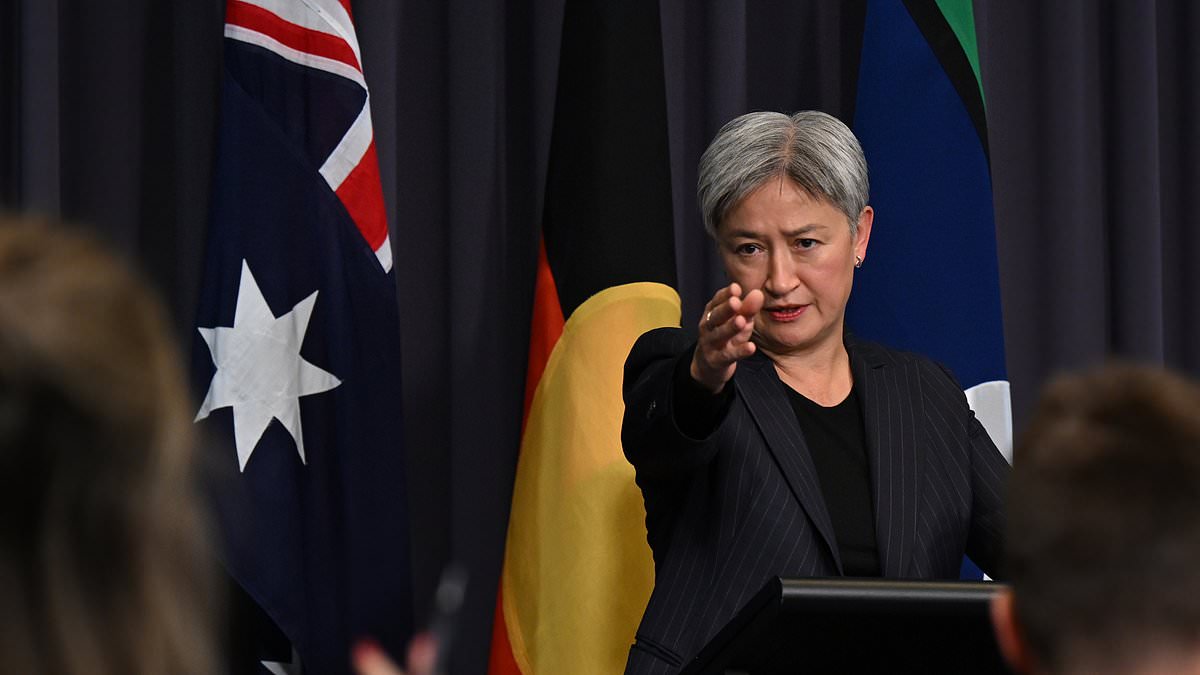Foreign Minister Penny Wong has confirmed that the Albanese government supports the United States’ military strikes on Iranian nuclear facilities, marking a significant shift in tone just hours after Canberra initially stopped short of endorsing the action.
‘The world has agreed Iran cannot be allowed to get a nuclear weapon. So yes, we support action to prevent that. And that is what this is,’ she said on ABC’s AM show.
‘The big question is now what? And says, like so many other countries, we do not want escalation and a full scale war and we continue to call for dialogue and diplomacy.’
When asked about the legality of the strikes, she said: ‘I think we are all clear that Iran … cannot be allowed to get a nuclear weapon. So yes, the government does support action to prevent that.’
Her comments came just hours after the Albanese government issued a statement that stopped short of supporting the strikes, instead calling for diplomatic efforts to resolve tensions.
‘We note the US president’s statement that now is the time for peace,’ the statement said.
‘The security situation in the region is highly volatile. We continue to call for de-escalation, dialogue and diplomacy.
‘ns in Israel and Iran and the region should continue to monitor public safety information provided by local authorities, including to shelter in place when required.
‘The Department of Foreign Affairs and Trade will be communicating directly with registered ns about preparations for assisted departures.’
Sunrise host Natalie Barr confronted Wong about the way the government handled it.
‘Why release a statement from an unnamed government spokesperson yesterday and then wait nearly 24 hours for you or the Prime Minister to speak?’
Wong replied: ‘I think the Government statement yesterday was re-clear. That the Government agreed with the international community, that Iran cannot be allowed to obtain a nuclear weapon.’
Barr hit back, and asked why Prime Minister Anthony Albanese has not spoken out about the bombing.
‘Don’t you think it’s unusual, our biggest ally bombs Iran and we release a statement from an unknown spokesperson, an unnamed spokesperson.
‘Yes, you’re here now, but would you not think it would have been something that the leader of this country would have spoken about before now?’
‘Hang on, it’s not an unusual thing for government to use spokespeople.
‘I’m sure you will hear from the Prime Minister today. I would make this point: we have been, I think, very up-front and clear over these last… these last days and weeks as we see what is happening in the Middle East about the Government’s position. Our position today is consistent with what I have been saying, the Prime Minister has been saying, for many days now. What comes next is very concerning, obviously, globally and for as well.’
After days of growing escalation, Trump stunned the world by launching a massive military strike intended to terminate Iran’s quest for a doomsday nuclear weapon.
Trump ordered the devastating attack on Saturday and six B-2 stealth bombers dropped a dozen 30,000-pound ‘bunker buster’ bombs on Iran’s primary nuclear facility.
‘The strikes were a spectacular military success,’ Trump said in a late-night address to the nation from the White House.
Trump claimed the top secret uranium enrichment base hidden deep inside a mountain at Fordow, 80 miles south of Tehran, was flattened.
U.S. submarines also fired 30 Tomahawk missiles and wiped out two other Iranian nuclear sites at Natanz and Isfahan.
Iran’s foreign minister condemned the offensive as ‘extremely dangerous, lawless and criminal behavior.’
‘The events this morning are outrageous and will have everlasting consequences,’ Seyed Abbas Araghchi said. ‘Iran reserves all options to defend its sovereignty, interest, and people.’
By Sunday morning, Israel was being struck by a barrage of missiles as Iran launched a retaliatory attack.
A rescue worker could be seen helping children in Haifa and buildings in Tel Aviv suffered significant damage as a number of people were reported wounded.
The dramatic series of events caught everyone off guard when Trump acted swiftly after meeting with his national security team in the White House Situation Room.
Just 48 hours earlier, the president had said he would decide ‘within two weeks’ whether to send in U.S. bombers to help Israel destroy Iran’s nuclear program.
It seemed the immediate prospect of a strike had receded and the world let out the breath it had been collectively holding.
Trump’s own MAGA movement had been tearing itself apart over the prospect of another Middle East war, and the president himself seemed outwardly confident there was still a chance of a diplomatic solution.
But all that changed very quickly as Trump became convinced that Iran’s Supreme Leader Ayatollah Ali Khamenei would never voluntarily give up his quest for a nuclear bomb.
‘s federal government has repeatedly the country is not a central player in the conflict, which was triggered in mid June when the Israeli military launched attacks on Iran in what it claimed was a bid to wipe out Iran’s nuclear program.
At least 430 people have been killed and another 3500 injured in Iran according to Iranian media outlet Nour News, while local Israeli authorities have reported 24 civilian deaths and almost 1300 injuries.
About 2600 ns in Iran are seeking assisted departures from the region, alongside about 1200 in Israel as the government urges travellers not to venture to either nation.
Staff from the Department of Foreign Affairs are helping ns leave and defence assets are expected to be deployed to assist evacuation efforts.
However, the government has insisted they will not be used in combat.
Some ns have already evacuated through land crossings but the government is also poised to help citizens leave once the airspace over both nations re-opens.
